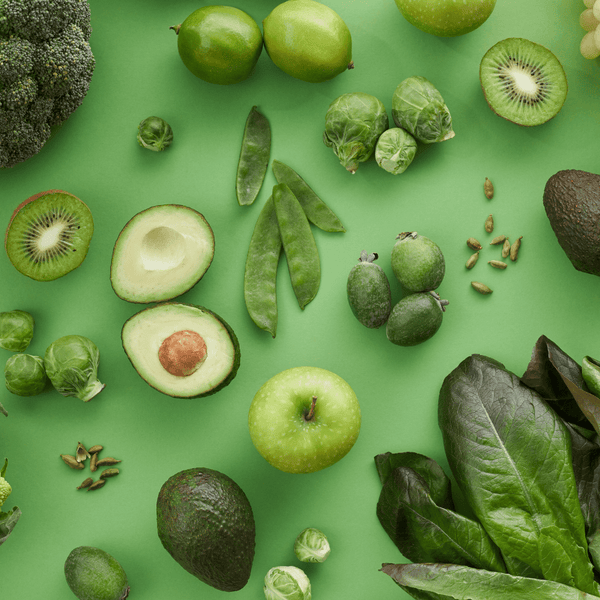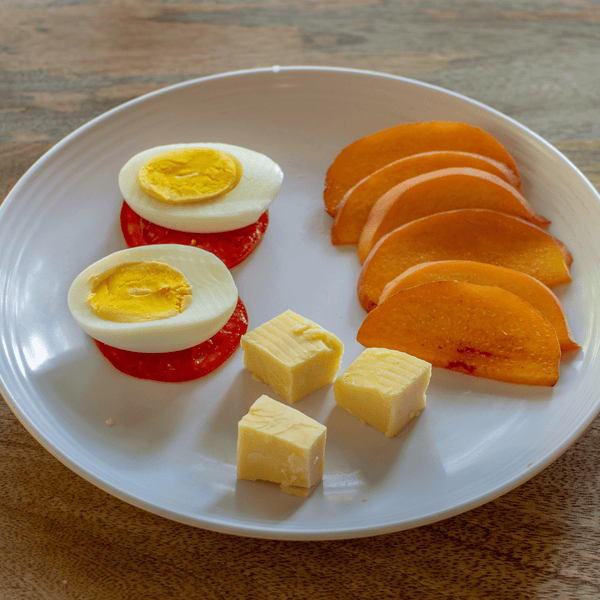Ever feel like your gut is throwing a tantrum every time you eat?
Bloating after lunch. That heavy, sluggish feeling. Your digestive system acting like it's constantly confused.
You're not the only one.
Most of us are walking around with unhappy guts, wondering why "healthy" foods sometimes make us feel worse. The culprit? We're missing the good stuff our gut bacteria actually want to eat.
Something that chicory root fiber provides really well.
This unsung hero has been quietly supporting digestive health for centuries. It's the secret ingredient that feeds your good gut bacteria and keeps things moving smoothly.
And here's the thing - you don't need to chug chalky fiber supplements to get it.
Smart snack brands are already weaving gut-friendly ingredients into delicious treats that actually taste good. Because let's be real - if it doesn't taste amazing, you're not going to stick with it.
So what exactly is chicory root fiber, and why should your gut care?
Let's dive in.
What is Chicory Root Fiber?
Picture a plant that looks like a dandelion's sophisticated cousin, with bright blue flowers and deep roots.
That's chicory.
This hardy little plant has been growing wild across Europe and North America for ages. But here's where it gets interesting - those thick, white roots are packed with a special type of fiber that your gut absolutely loves.
Chicory root fiber is extracted through a pretty straightforward process. The roots get cleaned, dried, and then the fiber is pulled out using hot water extraction.
Think of it like making really concentrated plant tea, except what's left behind is pure, soluble fiber.
The magic happens because chicory roots store energy as inulin - a natural prebiotic fiber that humans can't digest, but our gut bacteria can feast on. It's basically premium fuel for the good bugs in your digestive system.
Where will you spot chicory root fiber hiding?
It's everywhere once you start looking.
Protein bars, cereals, yogurts, and even some breads use it to boost fiber content. Many "high fiber" snacks rely on chicory root to hit those nutrition numbers without compromising taste.
The beauty of chicory root fiber is that it's virtually tasteless and dissolves easily. Unlike some fibers that make food taste like cardboard, chicory root actually improves texture.
It adds a subtle sweetness and helps create that satisfying, full feeling without any weird aftertaste.
So when you see "inulin" or "chicory root fiber" on an ingredient list, you're looking at one of nature's best prebiotic powerhouses.
Your gut bacteria are about to get very happy.
The Science: How Chicory Root Fiber Works in Your Gut
Here's what happens when chicory root fiber hits your digestive system.
It's actually pretty cool.
First, your stomach and small intestine completely ignore it. They can't break it down, so it slides right through like it's wearing an invisibility cloak.
But when it reaches your colon? Party time.
Your gut bacteria see chicory root fiber and think "Christmas morning." These beneficial microbes - the ones with names like Bifidobacteria and Lactobacilli - start munching away happily.
As they feast, something magical happens.
They produce short-chain fatty acids, especially butyrate. Think of butyrate as premium fuel for your colon cells. It keeps your gut lining healthy, reduces inflammation, and even supports your immune system.
This is why chicory root fiber is called a prebiotic - it's not a probiotic itself, but it feeds the good bacteria you already have.
The more good bacteria thrive, the less room bad bacteria have to cause trouble. It's like crowding out the troublemakers at a party by inviting more awesome guests.
Plus, as your gut bacteria multiply and get stronger, they help with everything from nutrient absorption to mood regulation. Yes, your gut health literally affects how you feel mentally.
The fermentation process also creates a gentle bulking effect, helping things move through your system more smoothly.
No dramatic digestive drama - just steady, consistent support for a happier gut.
Pretty impressive for something that started as a root in the ground.
Is Chicory Root Fiber Good for You?
Short answer: Yes, your gut will thank you.
Long answer: Let's break down why chicory root fiber is basically a multitasking superhero for your digestive system and overall health.
Digestive Health Gets a Major Upgrade
Remember those gut bacteria we talked about? When they're happy, your entire digestive system runs smoother.
Chicory root fiber helps reduce bloating, supports regular bowel movements, and can even ease symptoms of irritable bowel syndrome for some people.
It's like giving your gut a gentle tune-up instead of a harsh overhaul.
Weight Management Made Easier
Here's where things get interesting for anyone trying to maintain a healthy weight.
Chicory root fiber expands slightly in your stomach, creating that satisfying "full" feeling without extra calories. It literally helps you feel satisfied with less food.
Plus, when your gut bacteria are thriving, they send better hunger and fullness signals to your brain. Translation: fewer random cravings and better appetite control.
Blood Sugar Stays Steady
Chicory root fiber slows down how quickly your body absorbs sugar from food. This means fewer blood sugar spikes and crashes that leave you reaching for more snacks.
It's particularly helpful when paired with protein-rich foods that already support stable energy levels.
Speaking of protein - snacks like 100cal Snacks' Chocolate Brownie Bars combine 5g of vegan protein with gut-friendly ingredients, giving you that perfect balance of satisfaction and digestive support.
Hunger Control That Actually Works
Unlike some fiber supplements that make you feel uncomfortably stuffed, chicory root fiber creates natural satiety.
It helps regulate hormones like ghrelin (your hunger hormone) and GLP-1 (which signals fullness). This isn't about forcing yourself to eat less - it's about feeling naturally satisfied.
The best part? These benefits build over time.
As your gut bacteria population improves, you'll notice better digestion, more stable energy, and easier weight management without feeling deprived.
Safety Check: Side Effects & Who Should Be Careful
Some people experience gas, bloating, or stomach discomfort when they first introduce chicory root fiber to their diet. This usually happens when you go from zero to hero too quickly.
Your gut bacteria get overly excited about their new food source and throw a fermentation party that's a bit too enthusiastic.
Start Low, Go Slow
The golden rule? Begin with small amounts and let your digestive system adjust.
If you're new to chicory root fiber, start with just a few grams per day. Give your gut bacteria time to adapt before increasing your intake.
Think of it like training for a marathon - you wouldn't start with a 20-mile run on day one.
IBS Considerations
Here's where it gets tricky.
Some people with irritable bowel syndrome find chicory root fiber helpful for regularity and gut health. Others discover it triggers their symptoms, especially during flare-ups.
If you have IBS, introduce chicory root fiber very gradually and pay attention to how your body responds.
When to Pump the Brakes
Stop using chicory root fiber if you experience severe abdominal pain, persistent bloating, or digestive distress that doesn't improve after a few days.
The Smart Approach
Listen to your body. Most people tolerate chicory root fiber beautifully once they find their sweet spot.
But if your gut is telling you "not today," respect that signal.
Is Chicory Root Fiber Safe During Pregnancy?
Pregnancy and fiber - it's complicated.
Here's the deal: there isn't enough research to definitively say chicory root fiber is 100% safe during pregnancy.
Most healthcare providers take a "better safe than sorry" approach with prebiotic supplements and concentrated fiber sources when you're expecting.
The Cautious Route
While chicory root fiber isn't considered dangerous, pregnancy isn't the time to experiment with new digestive supplements.
Your body is already going through massive changes, and your digestive system might be more sensitive than usual.
Talk to Your Doctor First
Before adding any fiber supplements or significantly increasing fiber intake, check with your healthcare provider.
They know your specific situation and can guide you toward the safest options for you and your baby.
Gentle Alternatives
If you're dealing with pregnancy constipation, focus on whole food fiber sources first.
Fresh fruits, vegetables, and whole grains provide gentle fiber support without the concentrated effects of extracted chicory root.
Your doctor might also recommend pregnancy-safe fiber supplements specifically designed for expecting mothers.
Bottom Line
When in doubt, keep it simple during pregnancy. Whole foods first, supplements only with medical guidance.
How to Add Chicory Root Fiber to Your Diet
Forget chalky supplements and weird powders.
The easiest way to get chicory root fiber is through foods that already taste amazing.
Beyond the Supplement Aisle
Chicory root fiber naturally hides in plenty of everyday foods. Check labels on protein bars, granola, yogurt, and even some breads.
Many high-fiber cereals use chicory root to boost their numbers without affecting taste.
Coffee lovers, you're in luck - some coffee blends actually include roasted chicory root for extra flavor and fiber benefits.
Smart Snacking Strategy
This is where choosing the right snacks becomes a game-changer.
Instead of reaching for empty-calorie options, look for snacks that pack fiber and protein together, along with low calories. You get digestive support plus lasting energy.
100cal Snacks' BBQ Protein Puffs deliver this perfectly - gut-friendly ingredients plus 11g of vegetarian protein to keep you satisfied between meals.
For sweet cravings, our Peanut Butter Bars combine 6g of vegan protein with clean ingredients that support digestive health.
The Gradual Approach
Start by swapping one regular snack per day for a fiber-rich option.
Let your gut adjust, then add more as you feel comfortable.
Pro Tip
Read ingredient lists - if you see "inulin" or "chicory root fiber" in the first few ingredients, you're getting a meaningful amount.
The key is consistency, not perfection.
Small, daily choices add up to big digestive health improvements.








